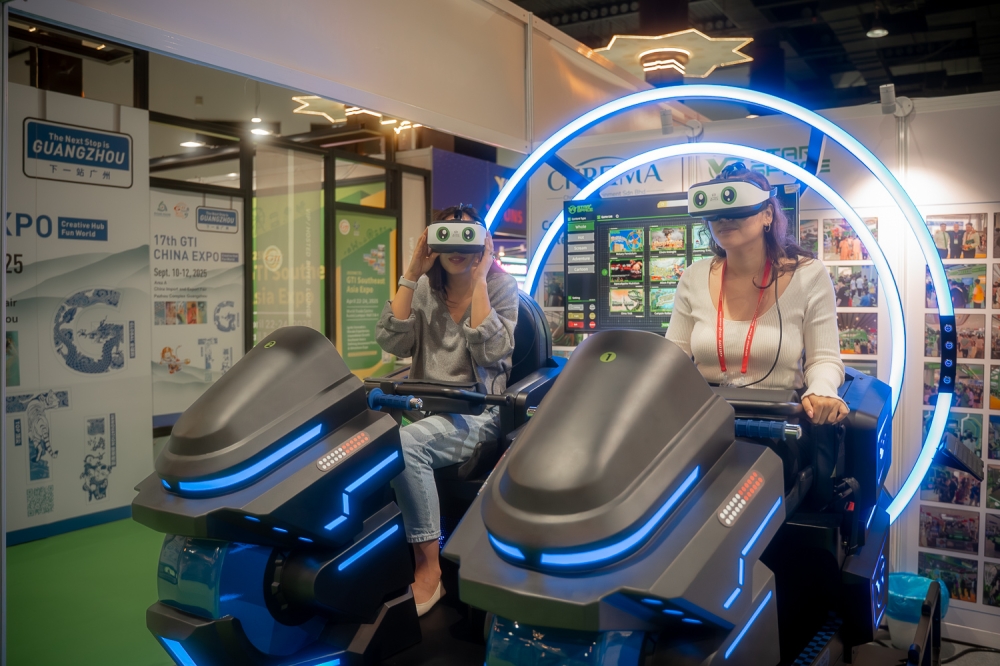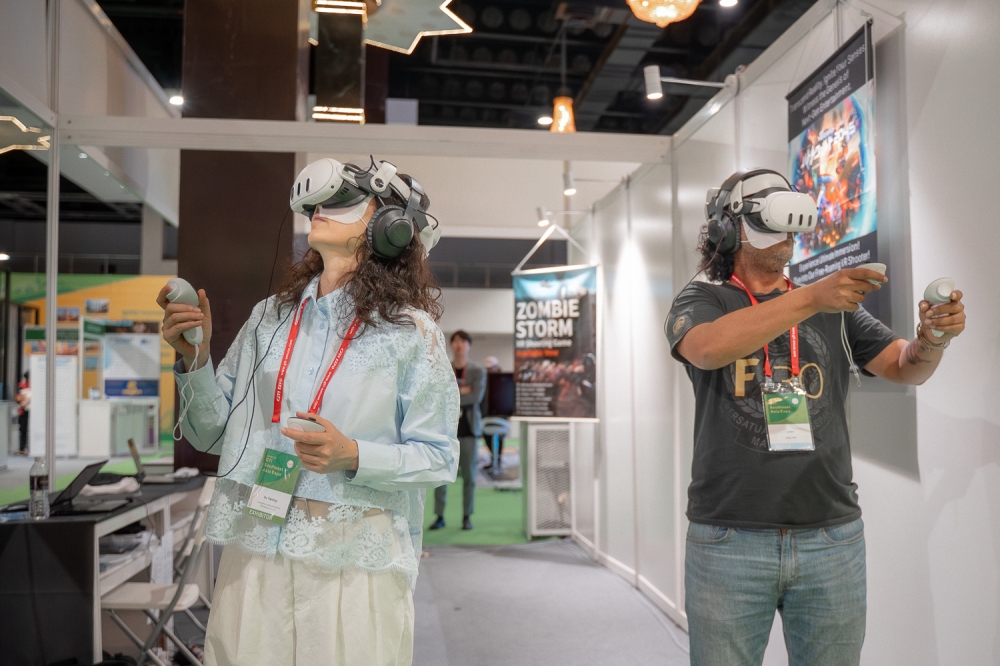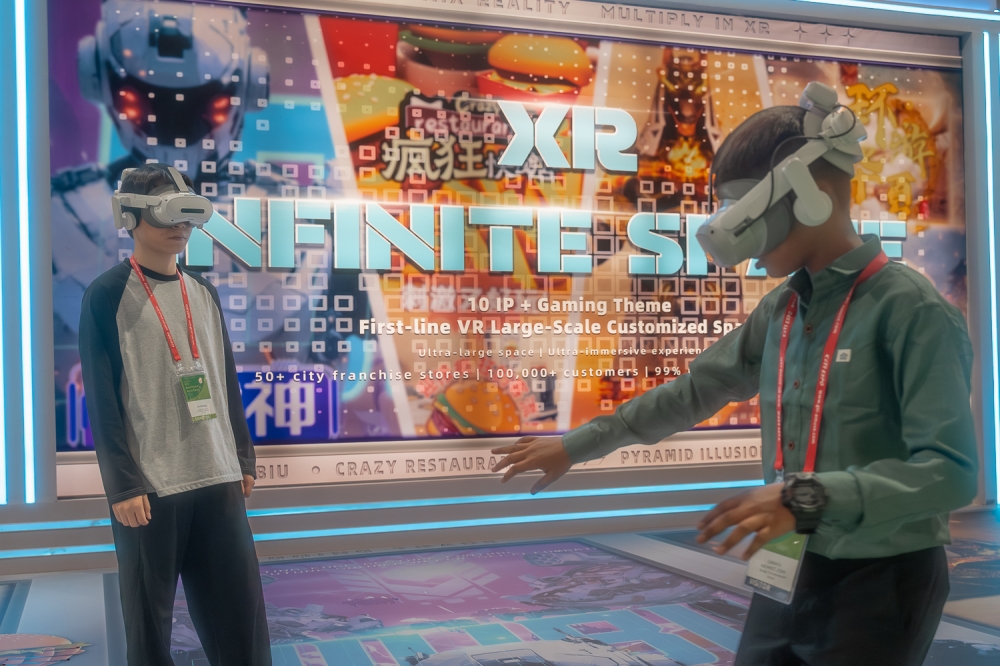KUALA LUMPUR, May 3 — Malaysia is increasingly positioned as a future hotspot for cutting-edge virtual entertainment, as global manufacturers pivot their focus towards Southeast Asia in response to evolving market dynamics.
This trend was illustrated at the recently concluded GTI South East Asia Expo held at the World Trade Centre Kuala Lumpur, which offered a compelling glimpse into the future of fun by unveiling the latest advancements in amusement, recreation, and digital sports technology.
Among the standout exhibitors capturing attention was MIXR (Mixed Reality Multiply in XR), a Chinese firm showcasing its innovative MXR simulation platform.
This “Glass-Free 9D Flying Theatre,” as described by MIXR representative Candy, immerses up to eight participants in a suspended, dome-screen environment, featuring experiences entirely developed in-house.
Malay Mail tested MIXR’s captivating underwater simulation, a journey featuring a cinematic tour of mythical Atlantis, a dramatic shark versus octopus battle, and a thrilling chase through oceanic depths.
The visual effects were breathtaking, skillfully blending educational elements with immersive 3D visuals and a powerful soundtrack. Encounters with graceful whales, manta rays, and atmospheric sunken ruins created an experience blurring the lines between a high-tech museum exhibit and a theme park thrill ride.

Game pods allow users to choose from various virtual experiences. — Picture by Raymond Manuel
“We are offering 20 different types of shows,” Candy explained. “The space required is around 50 square metres, and the cost of the whole setup comes to approximately US$56,000 (RM242,000). You can customise it however you want, and so far, this product is not in Malaysia yet.”
She added that their Guangzhou team developed the platform in just 45 days, building on eight years of R&D, with standard and 360-degree spinning VR rides also proving popular.
The expo floor buzzed with a wide array of virtual sports machines, covering everything from tennis and football to golf and boxing. These quick, engaging experiences represent a growing alternative to traditional attractions.
“Price is a factor,” noted Cindy, a salesperson at one booth. “Waiting hours for a roller coaster costing US$50 versus a quick wait for a 10–20 minute VR experience – many now prefer the latter. We’ve offered every sport possible in digital or virtual form and are seeing interest soar especially now in Southeast Asia after the tariffs.”
Another significant draw was “XR Mission Battleworld 2045,” an intense multiplayer virtual shooter from Japan’s Nihon XR Center. Players don VR headsets and wield controllers to dodge missiles and battle robotic foes.
“Having launched in November 2024, we attracted 40,000 players in five months and won the 2024 Auggie Award,” said producer and CEO Taiga Thomas Kobayashi. He highlighted the accessible setup cost (under US$10,000 for four players) and ease of installation, noting the game was developed cost-effectively over 10 months by India-based talent maintaining Japanese quality standards.

Visitors play the Battleworld 2045 VR game. — Picture by Raymond Manuel
Andrew Lee, GTI Global Ambassador and Chairman of the Expo Organising Committees, emphasized the event’s broader regional significance.
“This isn’t just a KL expo anymore; it’s for the region,” he said, pointing to exhibitors from Japan and Australia, and buyers flocking from the Middle East, India, and across Southeast Asia – including, for the first time, representatives from Sabah and Sarawak.
This year’s event, building on smaller versions in 2017 and 2018, deliberately focused on accessible entertainment options.
“Just like food and sleep, people need social interaction and enjoyment. That’s why we’re doing this. The amusement and attractions industry isn’t a luxury, it’s essential to how we live, especially in challenging times,” Lee added.
He also sees Malaysia as an ideal testing ground for these concepts.
“Not every family can visit Legoland in Johor. But a local mall offering an immersive VR ride can be just as exciting and far more accessible.” Lee acknowledged that trade uncertainties, like US-China tariffs, are accelerating interest in Southeast Asia as both a market and production base, creating opportunities for regional collaboration and positioning Malaysia favourably due to its infrastructure.
Beyond virtual realms, automation in the food and beverage sector also captured attention. A new generation of vending machines dispensing everything from customisable popcorn and cotton candy to hot pizza is gaining traction. Costing between US$2,000 and US$5,000, these units offer convenience, especially for time-pressed tourists, eliminating queues for quick snacks in resorts and urban centres, according to vendor Kiko.
Following its success, the GTI South East Asia Expo will to return to Kuala Lumpur in April 2026.

